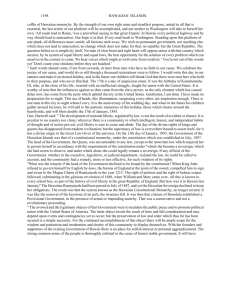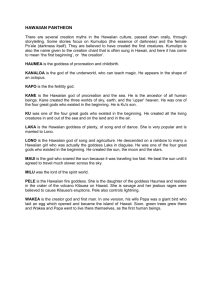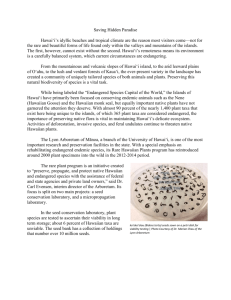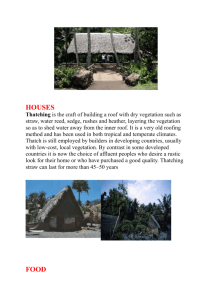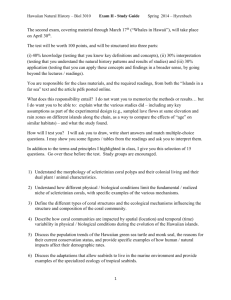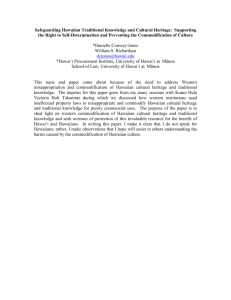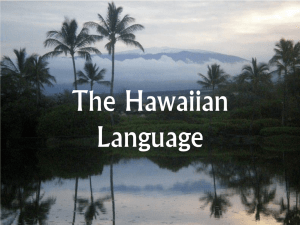Hawaiian Fields Work Group Report
advertisement
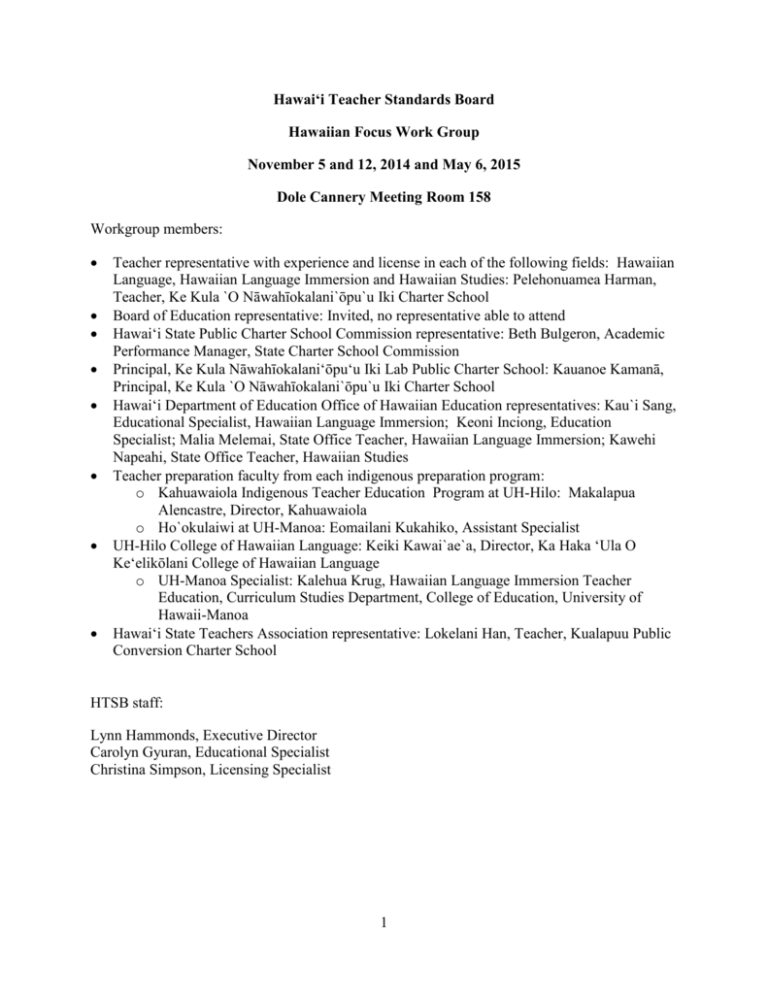
Hawaiʻi Teacher Standards Board Hawaiian Focus Work Group November 5 and 12, 2014 and May 6, 2015 Dole Cannery Meeting Room 158 Workgroup members: Teacher representative with experience and license in each of the following fields: Hawaiian Language, Hawaiian Language Immersion and Hawaiian Studies: Pelehonuamea Harman, Teacher, Ke Kula `O Nāwahīokalani`ōpu`u Iki Charter School Board of Education representative: Invited, no representative able to attend Hawaiʻi State Public Charter School Commission representative: Beth Bulgeron, Academic Performance Manager, State Charter School Commission Principal, Ke Kula Nāwahīokalaniʻōpuʻu Iki Lab Public Charter School: Kauanoe Kamanā, Principal, Ke Kula `O Nāwahīokalani`ōpu`u Iki Charter School Hawaiʻi Department of Education Office of Hawaiian Education representatives: Kau`i Sang, Educational Specialist, Hawaiian Language Immersion; Keoni Inciong, Education Specialist; Malia Melemai, State Office Teacher, Hawaiian Language Immersion; Kawehi Napeahi, State Office Teacher, Hawaiian Studies Teacher preparation faculty from each indigenous preparation program: o Kahuawaiola Indigenous Teacher Education Program at UH-Hilo: Makalapua Alencastre, Director, Kahuawaiola o Ho`okulaiwi at UH-Manoa: Eomailani Kukahiko, Assistant Specialist UH-Hilo College of Hawaiian Language: Keiki Kawai`ae`a, Director, Ka Haka ʻUla O Keʻelikōlani College of Hawaiian Language o UH-Manoa Specialist: Kalehua Krug, Hawaiian Language Immersion Teacher Education, Curriculum Studies Department, College of Education, University of Hawaii-Manoa Hawaiʻi State Teachers Association representative: Lokelani Han, Teacher, Kualapuu Public Conversion Charter School HTSB staff: Lynn Hammonds, Executive Director Carolyn Gyuran, Educational Specialist Christina Simpson, Licensing Specialist 1 REPORT Workgroup Charge: Pursuant to HTSB New Business Item 14-10, approved on October 3, 2014, the HTSB Executive Director will conduct two meetings of a work group to review, discuss, and make recommendations for possible action regarding Hawaiian license fields and levels, standards for these fields, and preparation of educators who will teach with these licenses. Task: This Work Group will review current practice, other national and international models for standards for indigenous teacher preparation programs, program review and licensure and make recommendations to be presented to the HTSB at their June 2015 meeting. Review and Discussion of Licensure: The Constitution of the State of Hawaiʻi provides: Art X, Sec 4: The promotion of Hawaiian culture, history and language in the public schools. Art XV, Sec 4: The English and Hawaiian as official languages of Hawaiʻi. Art X. Se Currently, Hawaiʻi has three license fields focused on Hawaiian language, history and culture: Hawaiian Language 6-12; Hawaiian Language Immersion (HLI) PK-3, K-6, 6-12, K-12 and P-12; Hawaiian Studies 6-12. Other licenses which were recommended by stakeholder groups for consideration were discussed and included the following: P-12 Generalist or Multiple Subject License: This license was suggested by Hawaiʻi Charter School principals in order to enable teachers to teach all core subjects in small or remote schools. The panel used the California Multiple Subject Credential as a basis for their discussion. No consensus was reached on the usefulness of this generalist license as there were concerns about the Hawaiʻi Department of Education’s determination of Highly Qualified status for such teachers. Cultural Practitioner: This license was also a suggestion made by charter schools. The panel did not support this idea as defining “cultural practitioner” is needed. There was concern that individuals could be deemed a “cultural practitioner” without sufficient knowledge in Hawaiian history, language and culture. There was also concern that some could try to circumvent professional training if they were awarded this license field without completion of an educator preparation program; Hawaiian Language Medium Licenses: The panel proposes the future development of Hawaiʻi’s teacher licenses to be offered for both Hawaiian and English medium 2 educational contexts in order to accommodate the growth and development of Hawaiian education. Parallel licenses for Hawaiian and English will need to be developed for all major content area licenses: For example, Mathematics 6-12English and Mathematics 6-12-Hawaiian; English Language Arts and Hawaiian Language Arts; TESOL and THSOL, etc. Licensure recommendations: After July 1, 2022, initial licensure in the separate fields of Hawaiian Language and Hawaiian Studies will not be issued; A new field of Hawaiian Knowledge P-3, K-6, 6-8, 6-12, K-12, P-12, will be issued as a blend of Hawaiian Language and Hawaiian Studies; The Hawaiian Language Immersion license be renamed Kaiaʻōlelo-Kaiapuni Hawaiʻi. Review and discussion of Hawaiian Standards: Current Content Standards for the three Hawaiian fields were originally adopted by HTSB in consultation with preparation faculty and teachers in the field. The consensus was that the standards were in need of revisions which advanced plans to be undertaken by the current panel. The decision was made to incorporate a review of the standards into this workgroup. A writing group was formed to include the DOE (Education Specialists and classroom teachers) and two EPPs (Kahuawaiola, UHHilo and Hoʻokulaiwi, UHMānoa). The Standards were discussed in depth during five meetings with revisions drafted. The panel has submitted recommendations for revision of the current Content Standards. The panel recommends adoption of the draft Standards, attached. The panel also felt strongly that all teachers in Hawaiʻi need to be familiar with the Hawaiian culture in order to integrate throughout their teaching. While this panel did not come to a consensus about how to achieve this goal, some members of the panel were instrumental in establishing a work group under the umbrella of the Teacher Education Coordinating Committee (TECC) to study this matter. Recommendations from the TECC group should be reviewed and considered by the HTSB. Review of Preparation Programs: Current Model: Kahuawaiola Indigenous Teacher Education Program at the University of Hawaiʻi-Hilo was last reviewed and accredited as a SATEP in 2009 by a joint review team composed of Hawaiʻi preparation faculty and teachers from the field along with representatives of the World Indigenous Nations Higher Education Consortium (WINHEC). 3 New Business Item (NBI) 10-40Rev, adopted 1/24/2011 revised the State Approval of Teacher Education Program Review Process by requiring Hawaiʻi preparation programs to achieve accreditation by a national teacher education accrediting body approved by the U. S. Department of Education to be eligible for HTSB approval for licensure programs. Since that time, the two existing teacher education accrediting bodies, National Council of Accreditation of Teacher Education (NCATE) and Teacher Education Accreditation Council (TEAC) have merged into one organization, Council for the Accreditation of Educator Preparation (CAEP). Since 2011 Kahuawaiola faculty have attended numerous local and national conferences and workshops to prepare for their upcoming review in 2016. However, they find that it is not an appropriate process to assess an indigenous education program. In fact, CAEP has shared that they do not have the capacity to individualize the review process to accommodate an indigenous education program. This work group recommends joint review by HTSB and WINHEC and, if available in the future, by WINHEC if it develops a teacher education review process. Assessment recommendations: Content Knowledge: Use of Hawaiian language proficiency assessment as a licensure assessment for content validation and to add a field; Performance Assessment: Preparation of a cadre of Hawaiian language scorers for a performance assessment adopted by the HTSB. Recommendations to HTSB: After July 1, 2022, initial licensure in the separate fields of Hawaiian Language and Hawaiian Studies not be issued; A new field of Hawaiian Knowledge P-3, K-6, 6-8, 6-12, K-12, and P-12 be issued as a blend of Hawaiian Language and Hawaiian Studies; The license field Hawaiian Language Immersion be renamed Kaiaʻōlelo-Kaiapuni Hawaiʻi; The attached standards be adopted for use by preparation providers and for licensure, with the provision that EPPs using the current standards may continue to use them until they have completed their next SATE review; Indigenous Education Programs be reviewed by a joint WINHEC/HTSB team of reviewers; That the content assessment (currently adminstered at UH Hilo as Hawaiian 490) be recognized for use as a licensure assessment and to add a field in Hawaiian Language, Hawaiian Studies, Kaiaʻōlelo-Kaiapuni Hawaiʻi and Hawaiian Knowledge if it is adopted. 4 5
